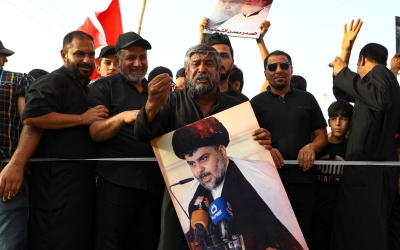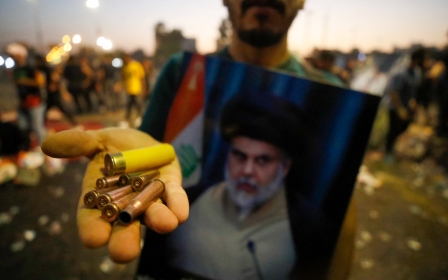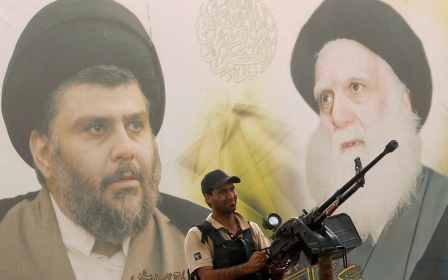Iraq: Sadr followers end protests after cleric calls on them to withdraw
Supporters of Muqtada al-Sadr, carrying guns and driving tuk-tuk vehicles, have begun withdrawing from Baghdad's Green Zone after the influential Shia cleric called on Tuesday for them to end their actions.
Following the move, the Iraqi military's Joint Operations Command said it had been decided to lift the nationwide curfew in the capital Baghdad and other provinces, following two days of violence.
During a news conference in Najaf, Sadr ordered his followers to end their protests, sparked by his withdrawal from politics on Monday, and apologised to Iraqis after 28 people were killed in clashes.
"This is not a revolution because it has lost its peaceful character," Sadr said. "The spilling of Iraqi blood is forbidden."
In a televised address delivered at 1pm (10:00 GMT), Sadr had set a one-hour deadline for his supporters to leave their protests in the fortified Green Zone in central Baghdad, where they have occupied parliament for weeks.
New MEE newsletter: Jerusalem Dispatch
Sign up to get the latest insights and analysis on Israel-Palestine, alongside Turkey Unpacked and other MEE newsletters
"Within 60 minutes, if the Sadrist Movement does not withdraw, including from the sit-in at parliament, then even I will leave the movement," Sadr said.
Following Sadr's call, Iraq Prime Minister Mustafa al-Kadhimi, an ally of the cleric, said: "The call of His Eminence Sayyid Muqtada al-Sadr to stop the violence represents the highest levels of patriotism and keenness to preserve Iraqi blood.
"His Eminence's speech holds everyone to a moral and national responsibility to protect Iraq's capabilities, stop the language of political and security escalation, and initiate a quick and fruitful dialogue to resolve crises."
'Uncontrolled militias'
Sadr's address came a day after the worst violence in the Iraqi capital in years, following a 10-month political deadlock since October's parliamentary elections between the Sadr and pro-Iran blocs, which prompted neighbouring Iran to close its border and halt flights to Iraq.
The prolonged political standoff, during which the two camps have competed for power, has given the country its longest run without a government and led to new unrest as Iraq struggles to recover from decades of conflict.
"There are uncontrolled militias, yes, but that does not mean the Sadrist Movement should also be uncontrolled," Sadr, a former anti-US insurgent leader, said in his address.
The latest fighting saw Sadr's supporters face off against armed groups loyal to Iran.
Militants had fired rockets at the Green Zone and gunmen cruised in pickup trucks carrying machine guns and brandishing grenade launchers, while residents observed a curfew.
Overnight, sustained gun and rocket fire rang out across the city.
Earlier on Tuesday, sources within the Popular Mobilisation Authority (PMA), a governmental paramilitary umbrella group that includes Sadr's Iran-backed rivals, told MEE that some armed groups, including the Badr Organisation, Kataib Hezbollah and Harakat Hezbollah al-Nujaba, had refused to become involved in the clashes with the Sadrists.
The sources said the three Iran-backed groups had rejected calls to become part of the defence forces both inside or outside the Green Zone.
"Those who are currently fighting are the brigades close to Abu Fadak, the chief of staff of the PMA," and “so far they have taken a self-defence position and have not attacked,” a senior PMA commander told MEE.
"We cannot use all our weapons to respond to them (the pro-Sadr fighters), because they always come with children and civilians and gather here, in a way that does not allow us to respond to them using medium or heavy weapons."
Basra calm
Also on Tuesday, pro-Sadr supporters in the southern city of Basra stormed the headquarters of Asaib Ahl al-Haq, one of the most influential Iraqi armed factions backed by Iran, torched the building and burned the images of assassinated Iranian Revolutionary Guard leader Qassem Soleimani and Iraqi militia leader Abu Mahdi al-Muhandis.
Clashes had fist erupted in Basra on Monday evening, but no casualties were reported.
Middle East Eye's correspondent in Basra reported that calm had returned to the city following Sadr's remarks.
Monday's violence was prompted by Sadr's announcement that he would withdraw from all political activity - a decision he said was in response to the failure of other Shia leaders and parties to reform a corrupt and decaying governing system.
The Iraqi military had declared an open-ended nationwide curfew and urged the protesters to leave the Green Zone, while the United States described the unrest as disturbing and called for dialogue to ease Iraq's political problems.
White House National Security Council spokesperson John Kirby said that Washington saw no immediate need to evacuate staff from its embassy in the Green Zone.
Reuters and AFP contributed to this report.
Middle East Eye delivers independent and unrivalled coverage and analysis of the Middle East, North Africa and beyond. To learn more about republishing this content and the associated fees, please fill out this form. More about MEE can be found here.





